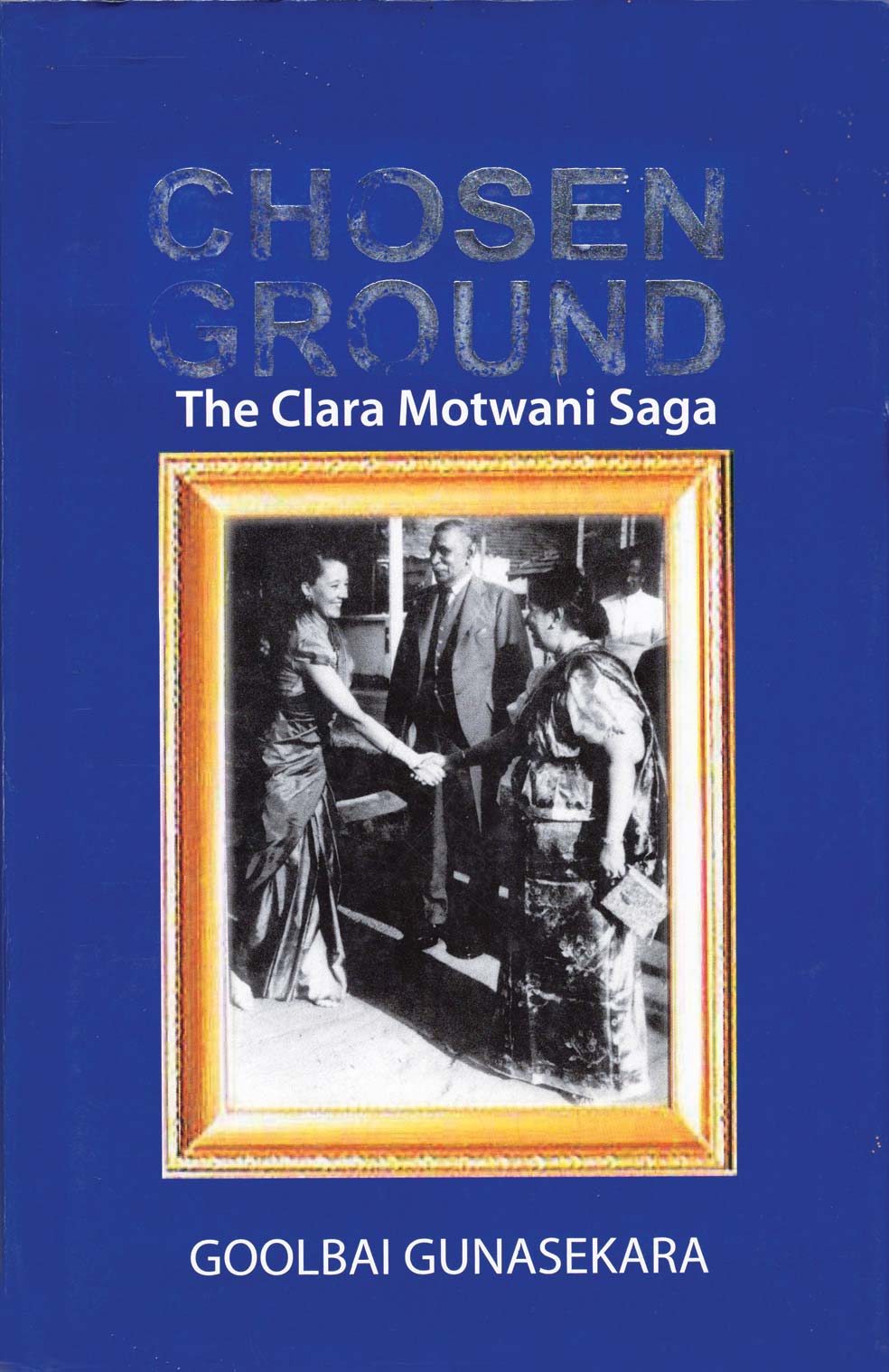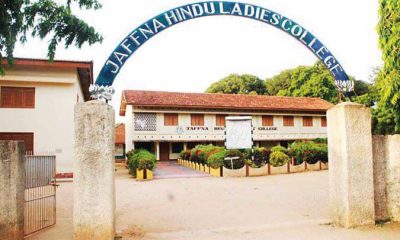Features
My time at Hindu Ladies College
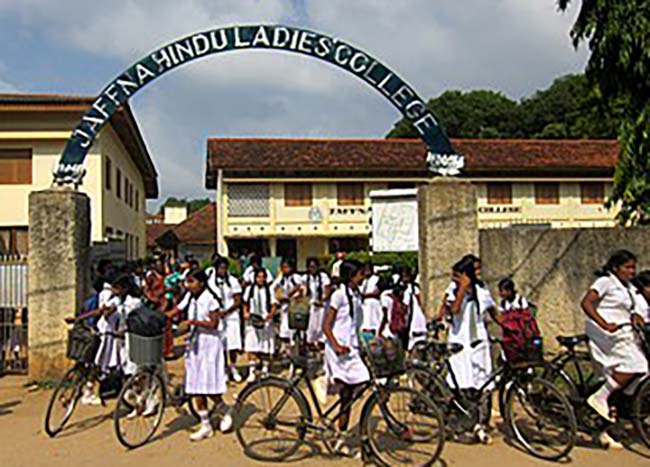
(This chapter on Goolbai Gunasekera’s Jaffna experience is excerpted from her book on her mother, Clara Motwani, Chosen Ground. The first chapter published last week was a response to ACB Pethiyagoda’s memoir of his time at Jaffna College.)
Mrs. Visaladhy Sivagurunathan, a philanthropic Hindu lady, had gifted the property of Hindu Ladies’ College to the school in 1943. Mother was the school’s fifth Principal. Under her, the first Past Pupils’ Association was formed, with Mrs. Jeevaratnam Rasiah as its first President. Miss Thambu (Mother’s long suffering Tamil tutor) was its Secretary. Just recently, I was invited to speak to the Colombo branch of the HLC alumni.
I met a former HLC teacher there — Mrs Navaratna, formerly Leela Ponniah — along with many old friends. The reverence in which Mother was held was very heart- warming, and it was a moving experience to hear the stories they related of instances in which Mother had touched — and sometimes directed — their lives.
A glamour figure on the HLC campus was a Miss Shantha from India. She wore the most gorgeous saris and influenced my love of cotton saris in years to come. It is strange indeed that one’s perceptions can be so acutely honed when one is still so young. To this day I can recall most of Miss Shantha’s wardrobe. Another fantastically good teacher was Vijayalakshmi Pathy. She was also one of the most attractive. She absorbed all Mother’s teaching methods; and her family in Britain, where she now lives, is a testimony to her fine guidance as a mother and grandmother, and not only as a teacher.
Picnics in Jaffna were given top priority. Mother liked to combine education with pleasure, so every picnic had some place of interest on the day’s agenda. We visited the Rosarian monks’ vineyards and place of retreat. We went to Keerimalai, which is a fresh water tank lying a few yards away from the sea. Bathing suits were not a part of our school wardrobes, but even in sarongs and bathing cloths we essayed a swimming stroke or two.
Visits to other schools were another distraction. Mother arranged netball matches with many Jaffna schools and colleges, and I particularly remember one with Vembadi Girls’ School, for I made a friend, Kiruba Moses, whom I remember to this day.
Mother was quickly drawn into the educational world of Jaffna. Miss Barker of Vembadi was a close friend and Principals’ meetings were many. Being somewhat young at the time, many illustrious names have now escaped me. I do recall having tea with Lady Ramanathan, the British wife of the founder of Ramanathan College. Her daughter, Mrs. Nadesan, was the nominal Head of that school but it was the senior Lady Ramanathan who pretty much ran things. Transport was occasionally in cars – often in buggy carts.
Athough Mother did not keep diaries that recorded her personal experiences, she was a great one to keep detailed notes of the educational aspects of her life. That she would keep notes on my progress was to be expected, but they were not the sort of notes one expects of a mother: they were the notes of an educationist. In years to come I was not enchanted to read: ‘Goolbai would do better in Mathematics if she were not so over confident. This carries over into other subjects too, I find’.
Whatever Mother thought of my shortcomings as a student, she positively glowed at my accomplishments in Jaffna. Her notes took on a lyrical quality. She rhapsodized: ‘My experiments seemed to have worked at last, and Goolbai is really doing so well I can hardly credit it’. Never could it be said that dilly-dallying was one of Mother’s failings. Taking the tide at its flood she arranged for all the new academic interest I was showing to be further enhanced by a little advanced private tuition in Science. My classmate Thilaka Karunanandan had a brother who had just finished his degree and was reputedly a brilliant scholar. Mother asked him if he would kindly tutor me in his spare time. He did.
When I was not studying on my own I was being tutored regularly. Along with my classmates, I played netball, studied, sang Tamil songs (which I quickly picked up) in the evenings, studied, had long icily refreshing well baths, studied, saw a movie once a month, studied and then studied some more. My mind was soon becoming as razor-sharp as those of the brilliant Tamil girls with whom I was now competing although, truth to tell, I was never in their league. The students of HLC had the tenacity of Bruce’s spider. They were always on an upward track.
“But what did you do in Jaffna?” Colombo friends would ask Mother later.
“We were always doing something,” Mother would answer, and we were.
Socially, a lot went on behind those cadjan walls that screened the houses and gardens of Jaffna residences from the road. Right opposite our home and almost next to the school lived Dr. and Mrs.
Canagasabai and their family. Dr. Canagasabai — a Malaya doctor, whose youngest daughter Dharma, had just left school —quickly struck up a friendship with us. Dr. Canagasabai had a very large garden with a badminton court and every evening we would play strenuous matches with the Canagasabai nieces, nephews and friends.
It was a sort of informal club. On moonlit nights picnics would be arranged to beaches and similar places, with no thought of danger in anyone’s mind. It was a time of peace. It was a time of friendship. These were the last few years before politics and politicians divided the island as surely as if they had taken a metaphorical knife and cut this lovely land and its people in half.
Sincerity, simplicity and affection were what Mother found in Jaffna. She had expected immovable bastions of conservatism. She found instead pliable minds and flexible brains. Jaffna has always remained a special place to the Motwanis. Before the 1983 tragedy stopped travel to the North, I took my husband and daughter to revisit my old school. It was a nostalgic time.
The school was on vacation but I had the permission of the Principal to wander through it. Buildings had quadrupled in size but the familiar classrooms still stood. I recalled with a shudder the time I opened my desk and found that a little snake had got in through the inkwell. Could this have been the very desk perhaps? There was still an inkwell in it.
Mother had begun the study of Tamil a week after she got to Jaffna. Our brand-new house had a broad veranda running right around it. An enormous desk occupied the shady side of it, and it was here that Mother had her lessons. She could never rid herself of that very American trait which had every waking moment gainfully utilized. Despite a heavy work schedule, Mother seriously tried to learn the language.
“Did she ever pick it up?” I asked her teacher, Thailnayagi Thambu (now Karunanandan) recently. “She was not in Jaffna long enough to really get into it,” was the tactful reply. Mother’s flair for languages did not translate well into the Oriental variety. She was considered the class wizard in Latin, French and Spanish but somehow her ear was not attuned to Sinhala and Tamil. Neither was it vital to learn either language when she first came to this island as the British still ruled and everything was in English. Father, on the other hand, picked up Sinhala in three months and was soon well able to berate our long suffering cook in an understandable lingo.
I drifted into Mother’s old office. It was still the same office but very modernized. It was here Mother had drilled her teachers in the requirements of the Dalton Plan.
This plan was a system she had greatly admired when visiting the Dalton School in New York. It required that teachers made detailed plans of their subject, and students were given these plans in the form of six-weekly advance schedules. A gifted student could then even proceed on her own, while a weak one could get help before the subject was taken up in class. At the Dalton School in New York, which I attended for a short time, I never got beyond History and English — but I did complete those syllabuses to Mother’s satisfaction.
“Your Mother motivated us instantly,” said Miss Leela Navaratne (nee Ponniah). “We understood the Plan, and it was brilliant from the start.”
Of course it worked well. The teachers of Jaffna were born with that same workaholic gene that Mother was finding in her pupils.
As I left the familiar grounds I took one long last look around. I somehow knew I would never see HLC again. Visits to Jaffna take a long time, and were not planned too easily even at that time. The memory of the picture my tall, lovely and gracious Mother made as she said her goodbye to the girls and Staff at Assembly that last day, is still fresh in my heart. And in my own heart the remembrance of Jaffna will always be green.
Our lovely days of quietness and harmony in Jaffna had drawn to a close and Mother returned to Colombo to head Musaeus College. One footnote that bears telling is that thanks to Mother’s recommendation, Dharma Canagasabai became an air hostess on the newly fledged Air Ceylon soon after Mother returned to Colombo.
Features
The invisible crisis: How tour guide failures bleed value from every tourist
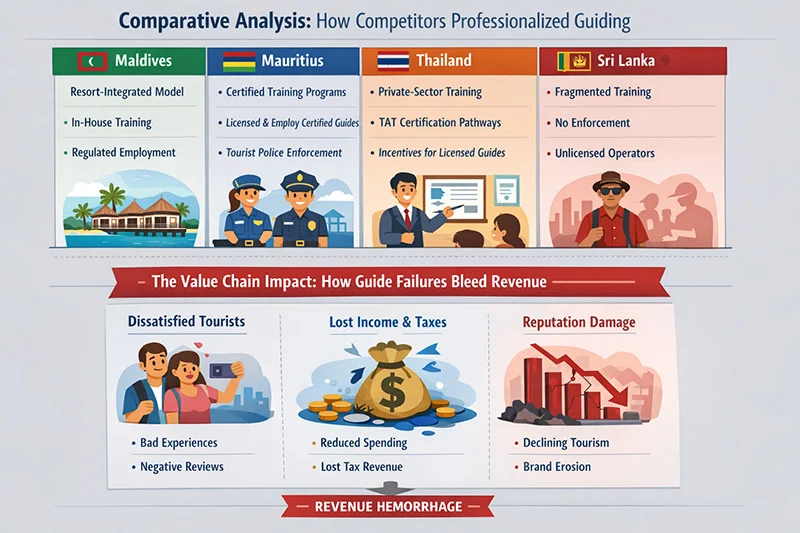
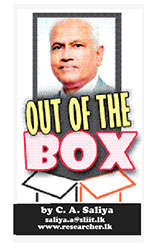 (Article 04 of the 04-part series on Sri Lanka’s tourism stagnation)
(Article 04 of the 04-part series on Sri Lanka’s tourism stagnation)
If you want to understand why Sri Lanka keeps leaking value even when arrivals hit “record” numbers, stop staring at SLTDA dashboards and start talking to the people who face tourists every day: the tour guides.
They are the “unofficial ambassadors” of Sri Lankan tourism, and they are the weakest, most neglected, most dysfunctional link in a value chain we pretend is functional. Nearly 60% of tourists use guides. Of those guides, 57% are unlicensed, untrained, and invisible to the very institutions claiming to regulate quality. This is not a marginal problem. It is a systemic failure to bleed value from every visitor.
The Invisible Workforce
The May 2024 “Comprehensive Study of the Sri Lankan Tour Guides” is the first serious attempt, in decades, to map this profession. Its findings should be front-page news. They are not, because acknowledging them would require admitting how fundamentally broken the system is. The official count (April 2024): SLTDA had 4,887 licensed guides in its books:
* 1,892 National Guides (39%)
* 1,552 Chauffeur Guides (32%)
* 1,339 Area Guides (27%)
* 104 Site Guides (2%)
The actual workforce: Survey data reveals these licensed categories represent only about 75% of people actually guiding tourists. About 23% identify as “other”; a polite euphemism for unlicensed operators: three-wheeler drivers, “surf boys,” informal city guides, and touts. Adjusted for informal operators, the true guide population is approximately 6,347; 32% National, 25% Chauffeur, 16% Area, 4% Site, and 23% unlicensed.
But even this understates reality. Industry practitioners interviewed in the study believe the informal universe is larger still, with unlicensed guides dominating certain tourist hotspots and price-sensitive segments. Using both top-down (tourist arrivals × share using guides) and bottom-up (guides × trips × party size) estimates, the study calculates that approximately 700,000 tourists used guides in 2023-24, roughly one-third of arrivals. Of those 700,000 tourists, 57% were handled by unlicensed guides.
Read that again. Most tourists interacting with guides are served by people with no formal training, no regulatory oversight, no quality standards, and no accountability. These are the “ambassadors” shaping visitor perceptions, driving purchasing decisions, and determining whether tourists extend stays, return, or recommend Sri Lanka. And they are invisible to SLTDA.
The Anatomy of Workforce Failure
The guide crisis is not accidental. It is the predictable outcome of decades of policy neglect, regulatory abdication, and institutional indifference.
1. Training Collapse and Barrier to Entry Failure
Becoming a licensed National Guide theoretically requires:
* Completion of formal training programmes
* Demonstrated language proficiency
* Knowledge of history, culture, geography
* Passing competency exams
In practice, these barriers have eroded. The study reveals:
* Training infrastructure is inadequate and geographically concentrated
* Language requirements are inconsistently enforced
* Knowledge assessments are outdated and poorly calibrated
* Continuous professional development is non-existent
The result: even licensed guides often lack the depth of knowledge, language skills, or service standards that high-yield tourists expect. Unlicensed guides have no standards at all. Compare this to competitors. In Mauritius, tour guides undergo rigorous government-certified training with mandatory refresher courses. The Maldives’ resort model embeds guide functions within integrated hospitality operations with strict quality controls. Thailand has well-developed private-sector training ecosystems feeding into licensed guide pools.
2. Economic Precarity and Income Volatility
Tour guiding in Sri Lanka is economically unstable:
* Seasonal income volatility: High earnings in peak months (December-March), near-zero in low season (April-June, September)
* No fixed salaries: Most guides work freelance or commission-based
* Age and experience don’t guarantee income: 60% of guides are over 40, but earnings decline with age due to physical demands and market preference for younger, language-proficient guides
* Commission dependency: Guides often earn more from commissions on shopping, gem purchases, and restaurant referrals than from guiding fees
The commission-driven model pushes guides to prioritise high-commission shops over meaningful experiences, leaving tourists feeling manipulated. With low earnings and poor incentives, skilled guides exist in the profession while few new entrants join. The result is a shrinking pool of struggling licensed guides and rising numbers of opportunistic unlicensed operators.
3. Regulatory Abdication and Unlicensed Proliferation
Unlicensed guides thrive because enforcement is absent, economic incentives favour avoiding fees and taxes, and tourists cannot distinguish licensed professionals from informal operators. With SLTDA’s limited capacity reducing oversight, unregistered activity expands. Guiding becomes the frontline where regulatory failure most visibly harms tourist experience and sector revenues in Sri Lanka.
4. Male-Dominated, Ageing, Geographically Uneven Workforce
The guide workforce is:
* Heavily male-dominated: Fewer than 10% are women
* Ageing: 60% are over 40; many in their 50s and 60s
* Geographically concentrated: Clustered in Colombo, Galle, Kandy, Cultural Triangle—minimal presence in emerging destinations
This creates multiple problems:
* Gender imbalance: Limits appeal to female solo travellers and certain market segments (wellness tourism, family travel with mothers)
* Physical limitations: Older guides struggle with demanding itineraries (hiking, adventure tourism)
* Knowledge ossification: Ageing workforce with no continuous learning rehashes outdated narratives, lacks digital literacy, cannot engage younger tourist demographics
* Regional gaps: Emerging destinations (Eastern Province, Northern heritage sites) lack trained guide capacity
1. Experience Degradation Lower Spending
Unlicensed guides lack knowledge, language skills, and service training. Tourist experience degrades. When tourists feel they are being shuttled to commission shops rather than authentic experiences, they:
* Cut trips short
* Skip additional paid activities
* Leave negative reviews
* Do not return or recommend
The yield impact is direct: degraded experiences reduce spending, return rates, and word-of-mouth premium.

2. Commission Steering → Value Leakage
Guides earning more from commissions than guiding fees optimise for merchant revenue, not tourist satisfaction.
This creates leakage: tourism spending flows to merchants paying highest commissions (often with foreign ownership or imported inventory), not to highest-quality experiences.
The economic distortion is visible: gems, souvenirs, and low-quality restaurants generate guide commissions while high-quality cultural sites, local artisan cooperatives, and authentic restaurants do not. Spending flows to low-value, high-leakage channels.
3. Safety and Security Risks → Reputation Damage
Unlicensed guides have no insurance, no accountability, no emergency training. When tourists encounter problems, accidents, harassment, scams, there is no recourse. Incidents generate negative publicity, travel advisories, reputation damage. The 2024-2025 reports of tourists being attacked by wildlife at major sites (Sigiriya) with inadequate safety protocols are symptomatic. Trained, licensed guides would have emergency protocols. Unlicensed operators improvise.
4. Market Segmentation Failure → Yield Optimisation Impossible
High-yield tourists (luxury, cultural immersion, adventure) require specialised guide-deep knowledge, language proficiency, cultural sensitivity. Sri Lanka cannot reliably deliver these guides at scale because:
* Training does not produce specialists (wildlife experts, heritage scholars, wellness practitioners)
* Economic precarity drives talent out
* Unlicensed operators dominate price-sensitive segments, leaving limited licensed capacity for premium segments
We cannot move upmarket because we lack the workforce to serve premium segments. We are locked into volume-chasing low-yield markets because that is what our guide workforce can provide.
The way forward
Fixing Sri Lanka’s guide crisis demands structural reform, not symbolic gestures. A full workforce census and licensing audit must map the real guide population, identify gaps, and set an enforcement baseline. Licensing must be mandatory, timebound, and backed by inspections and penalties. Economic incentives should reward professionalism through fair wages, transparent fees, and verified registries. Training must expand nationwide with specialisations, language standards, and continuous development. Gender and age imbalances require targeted recruitment, mentorship, and diversified roles. Finally, guides must be integrated into the tourism value chain through mandatory verification, accountability measures, and performancelinked feedback.
The Uncomfortable Truth
Can Sri Lanka achieve high-value tourism with a low-quality, largely unlicensed guide workforce? The answer is NO. Unambiguously, definitively, NO. Sri Lanka’s guides shape tourist perceptions, spending, and satisfaction, yet the system treats them as expendable; poorly trained, economically insecure, and largely unregulated. With 57% of tourists relying on unlicensed guides, experience quality becomes unpredictable and revenue leaks into commission-driven channels.
High-yield markets avoid destinations with weak service standards, leaving Sri Lanka stuck in low-value, volume tourism. This is not a training problem but a structural failure requiring regulatory enforcement, viable career pathways, and a complete overhaul of incentives. Without professionalising guides, high-value tourism is unattainable. Fixing the guide crisis is the foundation for genuine sector transformation.
The choice is ours. The workforce is waiting.
This concludes the 04-part series on Sri Lanka’s tourism stagnation. The diagnosis is complete. The question now is whether policymakers have the courage to act.
For any concerns/comments contact the author at saliya.ca@gmail.com
(The writer, a senior Chartered Accountant and professional banker, is Professor at SLIIT, Malabe. The views and opinions expressed in this article are personal.)
Features
Recruiting academics to state universities – beset by archaic selection processes?

Time has, by and large, stood still in the business of academic staff recruitment to state universities. Qualifications have proliferated and evolved to be more interdisciplinary, but our selection processes and evaluation criteria are unchanged since at least the late 1990s. But before I delve into the problems, I will describe the existing processes and schemes of recruitment. The discussion is limited to UGC-governed state universities (and does not include recruitment to medical and engineering sectors) though the problems may be relevant to other higher education institutions (HEIs).
How recruitment happens currently in SL state universities
Academic ranks in Sri Lankan state universities can be divided into three tiers (subdivisions are not discussed).
* Lecturer (Probationary)
– recruited with a four-year undergraduate degree. A tiny step higher is the Lecturer (Unconfirmed), recruited with a postgraduate degree but no teaching experience.
* A Senior Lecturer can be recruited with certain postgraduate qualifications and some number of years of teaching and research.
* Above this is the professor (of four types), which can be left out of this discussion since only one of those (Chair Professor) is by application.
State universities cannot hire permanent academic staff as and when they wish. Prior to advertising a vacancy, approval to recruit is obtained through a mind-numbing and time-consuming process (months!) ending at the Department of Management Services. The call for applications must list all ranks up to Senior Lecturer. All eligible candidates for Probationary to Senior Lecturer are interviewed, e.g., if a Department wants someone with a doctoral degree, they must still advertise for and interview candidates for all ranks, not only candidates with a doctoral degree. In the evaluation criteria, the first degree is more important than the doctoral degree (more on this strange phenomenon later). All of this is only possible when universities are not under a ‘hiring freeze’, which governments declare regularly and generally lasts several years.
Problem type 1
– Archaic processes and evaluation criteria
Twenty-five years ago, as a probationary lecturer with a first degree, I was a typical hire. We would be recruited, work some years and obtain postgraduate degrees (ideally using the privilege of paid study leave to attend a reputed university in the first world). State universities are primarily undergraduate teaching spaces, and when doctoral degrees were scarce, hiring probationary lecturers may have been a practical solution. The path to a higher degree was through the academic job. Now, due to availability of candidates with postgraduate qualifications and the problems of retaining academics who find foreign postgraduate opportunities, preference for candidates applying with a postgraduate qualification is growing. The evaluation scheme, however, prioritises the first degree over the candidate’s postgraduate education. Were I to apply to a Faculty of Education, despite a PhD on language teaching and research in education, I may not even be interviewed since my undergraduate degree is not in education. The ‘first degree first’ phenomenon shows that universities essentially ignore the intellectual development of a person beyond their early twenties. It also ignores the breadth of disciplines and their overlap with other fields.
This can be helped (not solved) by a simple fix, which can also reduce brain drain: give precedence to the doctoral degree in the required field, regardless of the candidate’s first degree, effected by a UGC circular. The suggestion is not fool-proof. It is a first step, and offered with the understanding that any selection process, however well the evaluation criteria are articulated, will be beset by multiple issues, including that of bias. Like other Sri Lankan institutions, universities, too, have tribal tendencies, surfacing in the form of a preference for one’s own alumni. Nevertheless, there are other problems that are, arguably, more pressing as I discuss next. In relation to the evaluation criteria, a problem is the narrow interpretation of any regulation, e.g., deciding the degree’s suitability based on the title rather than considering courses in the transcript. Despite rhetoric promoting internationalising and inter-disciplinarity, decision-making administrative and academic bodies have very literal expectations of candidates’ qualifications, e.g., a candidate with knowledge of digital literacy should show this through the title of the degree!
Problem type 2 – The mess of badly regulated higher education
A direct consequence of the contemporary expansion of higher education is a large number of applicants with myriad qualifications. The diversity of degree programmes cited makes the responsibility of selecting a suitable candidate for the job a challenging but very important one. After all, the job is for life – it is very difficult to fire a permanent employer in the state sector.
Widely varying undergraduate degree programmes.
At present, Sri Lankan undergraduates bring qualifications (at times more than one) from multiple types of higher education institutions: a degree from a UGC-affiliated state university, a state university external to the UGC, a state institution that is not a university, a foreign university, or a private HEI aka ‘private university’. It could be a degree received by attending on-site, in Sri Lanka or abroad. It could be from a private HEI’s affiliated foreign university or an external degree from a state university or an online only degree from a private HEI that is ‘UGC-approved’ or ‘Ministry of Education approved’, i.e., never studied in a university setting. Needless to say, the diversity (and their differences in quality) are dizzying. Unfortunately, under the evaluation scheme all degrees ‘recognised’ by the UGC are assigned the same marks. The same goes for the candidates’ merits or distinctions, first classes, etc., regardless of how difficult or easy the degree programme may be and even when capabilities, exposure, input, etc are obviously different.
Similar issues are faced when we consider postgraduate qualifications, though to a lesser degree. In my discipline(s), at least, a postgraduate degree obtained on-site from a first-world university is preferable to one from a local university (which usually have weekend or evening classes similar to part-time study) or online from a foreign university. Elitist this may be, but even the best local postgraduate degrees cannot provide the experience and intellectual growth gained by being in a university that gives you access to six million books and teaching and supervision by internationally-recognised scholars. Unfortunately, in the evaluation schemes for recruitment, the worst postgraduate qualification you know of will receive the same marks as one from NUS, Harvard or Leiden.
The problem is clear but what about a solution?
Recruitment to state universities needs to change to meet contemporary needs. We need evaluation criteria that allows us to get rid of the dross as well as a more sophisticated institutional understanding of using them. Recruitment is key if we want our institutions (and our country) to progress. I reiterate here the recommendations proposed in ‘Considerations for Higher Education Reform’ circulated previously by Kuppi Collective:
* Change bond regulations to be more just, in order to retain better qualified academics.
* Update the schemes of recruitment to reflect present-day realities of inter-disciplinary and multi-disciplinary training in order to recruit suitably qualified candidates.
* Ensure recruitment processes are made transparent by university administrations.
Kaushalya Perera is a senior lecturer at the University of Colombo.
(Kuppi is a politics and pedagogy happening on the margins of the lecture hall that parodies, subverts, and simultaneously reaffirms social hierarchies.)
Features
Talento … oozing with talent

 This week, too, the spotlight is on an outfit that has gained popularity, mainly through social media.
This week, too, the spotlight is on an outfit that has gained popularity, mainly through social media.
Last week we had MISTER Band in our scene, and on 10th February, Yellow Beatz – both social media favourites.
Talento is a seven-piece band that plays all types of music, from the ‘60s to the modern tracks of today.
The band has reached many heights, since its inception in 2012, and has gained recognition as a leading wedding and dance band in the scene here.
The members that makeup the outfit have a solid musical background, which comes through years of hard work and dedication
Their portfolio of music contains a mix of both western and eastern songs and are carefully selected, they say, to match the requirements of the intended audience, occasion, or event.
Although the baila is a specialty, which is inherent to this group, that originates from Moratuwa, their repertoire is made up of a vast collection of love, classic, oldies and modern-day hits.
The musicians, who make up Talento, are:
Prabuddha Geetharuchi:
(Vocalist/ Frontman). He is an avid music enthusiast and was mentored by a lot of famous musicians, and trainers, since he was a child. Growing up with them influenced him to take on western songs, as well as other music styles. A Peterite, he is the main man behind the band Talento and is a versatile singer/entertainer who never fails to get the crowd going.
Geilee Fonseka (Vocals):
A dynamic and charismatic vocalist whose vibrant stage presence, and powerful voice, bring a fresh spark to every performance. Young, energetic, and musically refined, she is an artiste who effortlessly blends passion with precision – captivating audiences from the very first note. Blessed with an immense vocal range, Geilee is a truly versatile singer, confidently delivering Western and Eastern music across multiple languages and genres.
Chandana Perera (Drummer):
His expertise and exceptional skills have earned him recognition as one of the finest acoustic drummers in Sri Lanka. With over 40 tours under his belt, Chandana has demonstrated his dedication and passion for music, embodying the essential role of a drummer as the heartbeat of any band.
Harsha Soysa:
(Bassist/Vocalist). He a chorister of the western choir of St. Sebastian’s College, Moratuwa, who began his musical education under famous voice trainers, as well as bass guitar trainers in Sri Lanka. He has also performed at events overseas. He acts as the second singer of the band
Udara Jayakody:
(Keyboardist). He is also a qualified pianist, adding technical flavour to Talento’s music. His singing and harmonising skills are an extra asset to the band. From his childhood he has been a part of a number of orchestras as a pianist. He has also previously performed with several famous western bands.
Aruna Madushanka:
(Saxophonist). His proficiciency in playing various instruments, including the saxophone, soprano saxophone, and western flute, showcases his versatility as a musician, and his musical repertoire is further enhanced by his remarkable singing ability.
Prashan Pramuditha:
(Lead guitar). He has the ability to play different styles, both oriental and western music, and he also creates unique tones and patterns with the guitar..
-

 Opinion5 days ago
Opinion5 days agoJamming and re-setting the world: What is the role of Donald Trump?
-

 Features5 days ago
Features5 days agoAn innocent bystander or a passive onlooker?
-

 Features2 days ago
Features2 days agoBrilliant Navy officer no more
-

 Features6 days ago
Features6 days agoRatmalana Airport: The Truth, The Whole Truth, And Nothing But The Truth
-

 Opinion2 days ago
Opinion2 days agoSri Lanka – world’s worst facilities for cricket fans
-

 Business6 days ago
Business6 days agoIRCSL transforms Sri Lanka’s insurance industry with first-ever Centralized Insurance Data Repository
-

 Business5 days ago
Business5 days agoAn efficacious strategy to boost exports of Sri Lanka in medium term
-

 Features3 days ago
Features3 days agoOverseas visits to drum up foreign assistance for Sri Lanka

